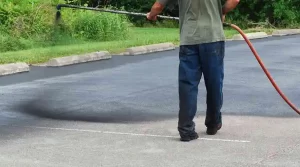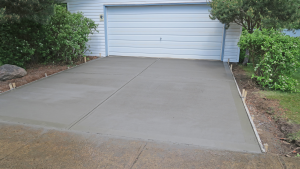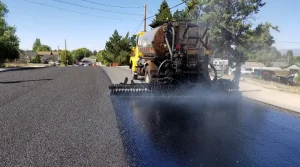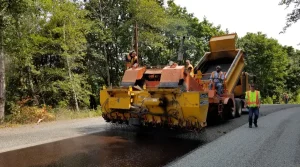Key Takeaways
- Early Detection is Crucial: Regularly inspect your driveway or indications of degradation, including potholes, fissures, and pooling water. More serious harm can be avoided with early identification and costly repairs.
- Professional Evaluation: If you need more clarification about the condition of your driveway, consider having a professional evaluate it. They can provide you with a comprehensive assessment and recommend the best solutions.
- Maintenance Matters: Regular maintenance, including seal coating and crack filling, is essential for prolonging the life of your asphalt driveway. Take action before problems become ever before takingnsider
- Replacement When Necessary: If your driveway shows extensive signs of damage, a complete replacement may be the most cost-effective solution in the long run.
Asphalt driveways are strong and look good but can face problems as they age. If you see that your driveway is wearing out, you might be wondering whether it needs repairs or should be replaced entirely. At Jersey City Paving
we focus on caring for and fixing driveways. We’re here to help you understand the critical signs that your asphalt driveway may need repair.
In this guide, we will look at the signs that your asphalt driveway might be breaking down. We will also discuss what can cause this damage and answer some common questions. By the end, you will know when to take action and what options you have.
Common Signs That Your Asphalt Driveway Needs Repair
1. Potholes
One of the most significant indicators that your driveway requires attention is the presence of potholes. Potholes are depressions in the asphalt that can arise as a result of the freezing and thawing of groundwater beneath the surface. As temperatures fluctuate, the soil expands and contracts, leading to cracks in the asphalt. When water seeps into these cracks and freezes, it can cause the asphalt to break apart, forming potholes.
Potholes are not just a cosmetic issue; they can also pose safety hazards for vehicles and pedestrians. They can damage your vehicle’s suspension and alignment, leading to costly repairs. While it’s possible to patch a pothole, this is often a temporary fix that doesn’t address the underlying issues with your driveway. In many cases, if your driveway has multiple potholes or significant structural damage, a complete replacement may be the best option.
2. Extensive Cracks
Cracks are another common sign that your asphalt driveway needs repair. They can be anything from tiny hairline cracks to larger fissures that can compromise the driveway’s integrity. Cracks often occur due to the effects of weather, traffic, and the asphalt’s natural aging process.
When cracks form, they can trap moisture, salt, oil, and other substances that can exacerbate the damage. Over time, these materials can penetrate deeper into the asphalt, causing the cracks to widen and deepen. If you notice several cracks in your driveway, arranging for repairs as soon as possible is essential. Sealcoating the cracks enhances the driveway’s appearance and prevents further damage by sealing off these vulnerable areas.
3. Water Drainage Issues
Proper drainage is crucial for the longevity of your asphalt driveway. If you notice water pooling in certain areas of your driveway, it’s a clear sign that you may need repairs. Poor drainage can further deteriorate the asphalt, creating an environment where cracks and potholes can thrive.
Water can collect on your driveway for several reasons, like bad grading, blocked drains, or the driveway settling over time. If these water problems are not fixed, they can lead to serious issues, like erosion under the driveway and more damage to the surface. A professional paving contractor can inspect your driveway’s drainage and recommend solutions to fix it.
4. Faded and Discolored Surface
The sun’s ultraviolet (UV) rays can damage your asphalt driveway, making it fade and lose its original color. While fading is a normal part of aging, it can also mean that your driveway is more likely to get damaged. A faded driveway may not hold up well against weather and other outside factors, leading to cracks and other problems.
If your driveway is very faded and has become brittle, it is time to consider sealing it or replacing it. Sealcoating can help bring back some color and protect it from the weather. However, if the damage is too much, you may need to replace the driveway.
Causes of Asphalt Deterioration
Knowing what causes asphalt to break down can help you take steps to keep your driveway in good shape for longer. Here are some common reasons why asphalt gets damaged:
- Weather Conditions: Extreme weather, like freezing temperatures, heavy rain, and strong sunlight, can make asphalt wear out faster. Changes in the seasons cause the asphalt to expand and shrink, which can lead to cracks and potholes.
- Traffic and Load: Heavy vehicles and regular traffic can lead to deterioration of the asphalt surface. Cracks and depressions may eventually result from the ongoing tension.
- Poor Installation: The driveway may be more susceptible to damage if the original installation was not done correctly. Issues such as inadequate base material, improper drainage, and insufficient compaction can lead to premature deterioration.
- Neglected Maintenance: Regular maintenance, including seal coating and crack filling, is essential for prolonging the life of your driveway. Ignoring these responsibilities can cause serious harm over time.
Frequently Asked Questions (FAQs)
Q1: How often should I seal my asphalt driveway?
A1: It’sSealing your asphalt driveway every 2-3 years is generally recommended, depending on the climate and the traffic it receives. Regular sealing helps protect the asphalt from UV rays, moisture, and other damaging elements.
Q2: Can I repair my driveway myself?
A2: While some minor repairs, like filling small cracks or patching potholes, can be done by homeowners, it’s best to consult with professionals for extensive repairs or replacements. They have the expertise and tools to ensure the job is done correctly.
Q3: How long does an asphalt driveway last?
A3: With proper maintenance, an asphalt driveway can last 15 to 20 years. However, climate, usage, and maintenance practices can significantly affect its lifespan.
Q4: What are the signs that I need a complete driveway replacement?
A4: If your driveway has extensive cracking, multiple potholes, significant water drainage issues, or a faded and brittle surface, it may be time for a complete replacement. A professional assessment can assist you in identifying the most course of action.
Q5: What can I do to prevent future damage to my asphalt driveway?
A5: Regular maintenance, including sealing, crack filling, and ensuring proper drainage, can help prevent future damage. Additionally, avoid parking heavy vehicles on the driveway for extended periods and keep it free of debris.
Conclusion
Your driveway is important for your home’s appearance and how well it works. By recognizing the signs of asphalt damage and understanding the causes, you can make smart choices about repairs and maintenance. At Jersey City Paving, our expert team is here to help you keep your driveway in great shape. If you’re facing any of the problems mentioned or want a professional evaluation, feel free to contact us. We offer free estimates and consultations to help you start on the path to a safer and better-looking driveway. Contact us today to learn more about our services and how we can help you!







